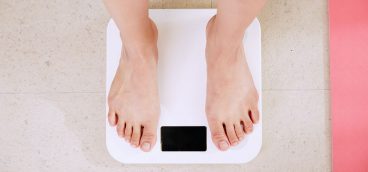Diet or Exercise: Which Is More Important for Weight Loss?

Question: “I have been exercising and trying to improve my diet to lose weight but am not having success. When it comes to weight loss, is diet or exercise more important?”
Adequately answering this question requires a clear understanding of why we pack on extra pounds, what must be done to lose excess weight, and an overview of the impact diet and exercise can have on that process.
Weight gain is the result of an energy imbalance. If you are carrying too much fat, it is because, over time, you’ve taken in more energy (calories) than were required to meet the body’s daily needs. The excess calories were deposited as body fat, stored for future use if needed. One pound of body fat is equal to approximately 3,500 calories of stored energy. The only proven way to lose the extra weight is to reverse the process—that is, take in fewer calories than needed to create what is commonly referred to as a “caloric deficit.” When you consume approximately 3500 calories fewer than the body requires, whether the deficit take place over a period of days, weeks, or even months, you will lose approximately one pound of fat. You can best achieve a caloric deficit through modifications of nutritional and activity behaviors.
Viewed from this perspective, both diet and exercise play important roles in weight loss. Wise dietary choices can reduce calorie intake while regular physical activity can increase the number of calories burned. Both situations can lead to weight loss. Short term, it is easier to eliminate calories through dietary changes than to burn the calories through exercise. For example, to burn 200 calories, you would have to jog about 2 miles. But, if you simply substitute a bottle of water for a medium-sized McDonald’s sugar-laden soda, you can save 200 calories.
Identify areas of your diet where calories can be eliminated without reducing portion size, taste or variety of foods. There are ways to cut calories even if you are consuming a healthy diet. For example, almonds are a nutritious, healthy, high protein snack, but they are also very high in calories. A cup of almonds munched while watching your favorite sitcom is roughly 700 to 800 calories. You would have to run 8 miles to burn off that many calories! Consider a cup of unbuttered popcorn, which contains fewer than 50 calories, as an alternative. You can save hundreds of calories with one simple decision. It pays dividends to read food labels carefully for calorie count, fat content and serving size in order to make informed dietary choices that are in your best interests. How you prepare foods, what toppings are used, how often you eat out and where you eat are all choices that affect the calorie count of meals. In the end, calories do count!
However, do not underestimate the benefits of regular exercise on weight loss and health in general. Expending an extra 100 calories every day—the equivalent of walking just 20 minutes—results in a fat loss of approximately 10 pounds over the course of a year, assuming you do not increase calorie intake.
Adding muscle to your frame through weight (resistance) training can also help to speed fat loss. Because muscle tissue requires calories just to maintain itself, increasing muscle elevates your resting metabolic rate, burning additional calories even when at rest. This extra energy burn, although relatively small, can be the difference between gaining several pounds or maintaining normal weight over the course of a year.
Keep in mind that there are many good reasons to exercise other than merely burning calories. A significant body of evidence strongly suggests that regular physical activity, whether it be unstructured exercise or formal workouts, can prevent or at least delay the onset of many degenerative diseases. Heart disease, stroke, cancer, high blood pressure, obesity and diabetes have all been linked to a sedentary lifestyle. Pursuing an active lifestyle, even if you don’t lose all the weight you might like, can improve the quality of life.
In summary, diet and exercise work in concert to impact a person’s body weight. One without the other will not achieve the objective of permanent weight loss. In my opinion, it is not possible to exercise your way out of a poor diet. Likewise, a highly restrictive diet plan is difficult to maintain over the long haul. The key to successful long-term weight management is to adopt habits that eliminate needless calories and/or burn additional calories. In doing so, you can reap the positive benefits of a physically active lifestyle and, at the same time, achieve a healthy body weight.




